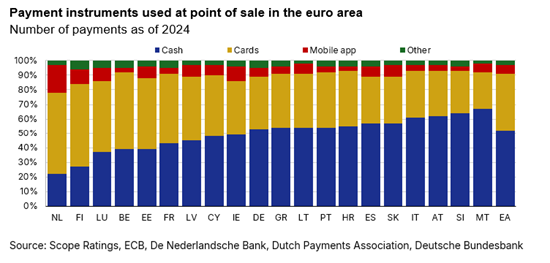Announcements
Drinks

Digital euro: a wake-up call for banks to adapt and innovate
“Banks must prepare for the challenges and opportunities emanating from moves to implement a digital euro,” said Milya Safiullina, an analyst in Scope’s financial institutions team. “This means investing in digital infrastructure to ensure real-time processing, robust payment gateways, modern digital wallets and security while remaining compliant with evolving regulatory frameworks and ensuring seamless compatibility with the ECB's digital euro architecture.”
As a payment tool, the digital euro would directly compete with established options such as card and mobile payments. “This competition could diminish banks' ability to generate revenue from traditional services, like card issuance, payment processing and transaction fees,” Safiullina added. “In a less supportive interest-rate environment where banks are already under pressure to find new sources of income, a reduction in fee-based revenue could significantly impact profitability.”
Banks are already facing increasing competitive pressure on payment fees, as non-bank payment service providers and fintechs have become integral to the payments ecosystem.

Funding challenges
The digital euro could also pose potential funding challenges to banks. “As a potential store of value, a digital euro held in an ECB-guaranteed wallet could offer users a safer and more reliable alternative to traditional bank deposits. If people start holding more of their funds in digital euros instead of traditional bank deposits, banks could see deposit balances shrink. This could affect their ability to lend money and will increase the cost of funding,” Safiullina cautioned.
In times of financial crisis, individuals and companies would likely exchange significant amounts of their bank deposits into digital euros, leading to liquidity shortages and undermining the stability of the banking system.
“For this reason, it is important for banks that the digital euro is introduced with a narrow payment function, disincentivising its use as a savings and investment vehicle,” Safiullina said. “Holding limits and the absence of remuneration would significantly reduce the incentive for users to store large amounts of money in a digital euro wallet. Limiting merchants’ ability to hold digital euros and the ‘reverse waterfall’ mechanism could also work to contain any deposit outflows from the banking sector.”
We see a clear advantage for early adopters and believe that larger banks, with their greater investment capacity are better positioned to tackle this challenge given the associated costs.






